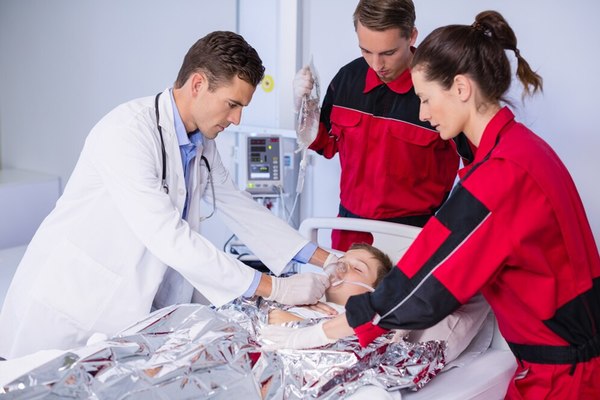
Introduction:
In the intricate tapestry of healthcare, few roles are as pivotal and demanding as that of an emergency physician. Operating at the forefront of medical care, these professionals are tasked with the challenging responsibility of assessing, diagnosing, and treating patients in critical conditions. This article delves into the multifaceted role of an emergency physician, shedding light on their vital contributions to patient care and the healthcare system as a whole.
The Foundations of Emergency Medicine
Emergency medicine is a specialized field that demands a unique skill set and mindset. Emergency physicians undergo rigorous training to equip themselves with the knowledge and expertise required to handle a diverse range of medical emergencies. From cardiac arrests and traumatic injuries to respiratory distress and severe infections, these professionals must be prepared to act decisively and swiftly in high-pressure situations.
Rapid Triage and Assessment
One of the primary responsibilities of an emergency physician is to triage and assess patients efficiently. In the chaotic environment of the emergency department (ED), time is of the essence. Emergency physicians utilize their clinical acumen and training to prioritize patients based on the severity of their condition. By conducting rapid assessments and implementing evidence-based protocols, they ensure that those in urgent need receive timely care.
Comprehensive Medical Evaluation
Beyond triage, emergency physicians conduct comprehensive medical evaluations to determine the underlying cause of a patient's symptoms. This often involves obtaining a detailed medical history, performing a thorough physical examination, and ordering diagnostic tests such as blood work, imaging studies, and electrocardiograms (ECGs). By meticulously piecing together clinical clues, they arrive at accurate diagnoses and formulate appropriate treatment plans.
Multidisciplinary Collaboration
Effective patient care in the emergency setting relies on seamless collaboration among healthcare professionals. Emergency physicians work closely with nurses, paramedics, specialists, and other members of the healthcare team to coordinate care and ensure optimal outcomes for patients. This interdisciplinary approach fosters communication, enhances efficiency, and promotes a holistic approach to patient management.
Life-Saving Interventions
In critical situations, emergency physicians must be prepared to administer life-saving interventions to stabilize patients and prevent further deterioration. This may include cardiopulmonary resuscitation (CPR), advanced airway management, intravenous (IV) fluid resuscitation, and defibrillation. With expertise in emergent procedures and protocols, they strive to intervene swiftly and decisively to save lives.
Trauma Care and Emergency Procedures
Traumatic injuries represent a significant portion of cases seen in the ED, ranging from motor vehicle accidents to falls and assaults. Emergency physicians are trained to manage trauma patients with precision and efficiency, employing techniques such as hemorrhage control, fracture stabilization, and rapid assessment of injury severity. Additionally, they are proficient in performing emergency procedures such as chest tube insertion, thoracotomy, and emergent surgical interventions when necessary.
Critical Thinking and Decision-Making
The dynamic nature of emergency medicine demands strong critical thinking and decision-making skills. Emergency physicians must rapidly synthesize vast amounts of clinical data, prioritize interventions, and adapt to evolving circumstances. Whether faced with a complex medical mystery or a mass casualty incident, they remain calm under pressure and employ sound judgment to navigate challenging situations.
Patient Advocacy and Empathy
Beyond their clinical expertise, emergency physicians serve as advocates for their patients, ensuring that their voices are heard and their needs are addressed. Amid the chaos, they demonstrate empathy and compassion, providing reassurance and support to individuals and families facing medical crises. By fostering trust and rapport, they facilitate healing and promote patient-centered care.
Continuing Education and Professional Development
The field of emergency medicine is constantly evolving, with new technologies, treatments, and protocols emerging regularly. As such, emergency physicians are committed to lifelong learning and professional development. Through conferences, workshops, and ongoing training programs, they stay abreast of the latest advancements in their field, honing their skills and expanding their knowledge base to provide the highest standard of care.
Conclusion
In conclusion, the role of an emergency physician is both demanding and rewarding, requiring a unique blend of clinical expertise, critical thinking, and compassion. From triage and assessment to life-saving interventions and trauma care, these dedicated professionals play a pivotal role in safeguarding the health and well-being of individuals in times of crisis. As we acknowledge their invaluable contributions to the healthcare system, let us continue to support and honor emergency physicians for their unwavering commitment to patient care.
For healthcare professionals aspiring to join the ranks of emergency physicians or seeking to enhance their skills in emergency medicine, explore our comprehensive resources and training programs at PhysicianReady.com. Together, let us advance the field of emergency medicine and empower healthcare professionals to provide exemplary care in times of need.

Leave Comment Below
0 Comment(s)